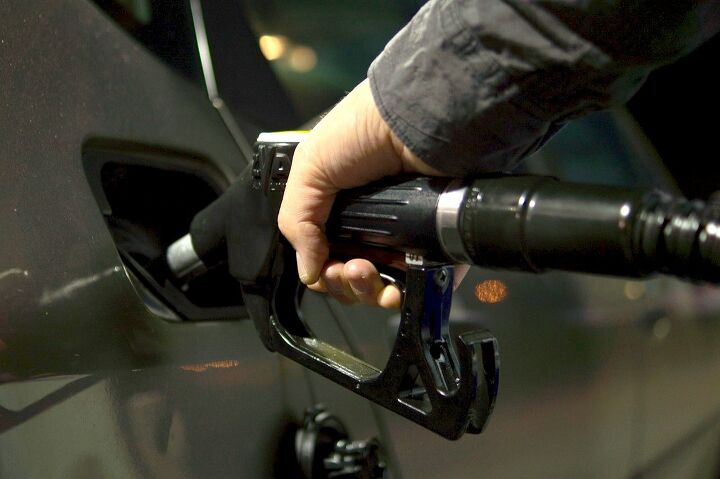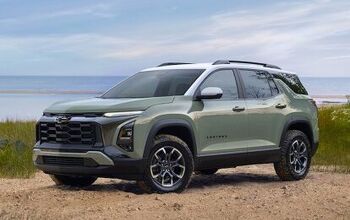Feds Decide to Cut Automakers Some Slack Over Fuel Economy Penalties

Government regulators have heard the auto industry’s plea for clemency pertaining to the United States’ corporate average fuel economy (CAFE).
Responding to a petition from industry groups, the National Highway Traffic Safety Administration is putting the brakes on a planned increase in penalties for not complying with CAFE standards. Automakers won’t have to worry about their 2015, 2016 and 2017 model-year vehicles anymore, as the penalties will now begin with 2019 models.
According to Automotive News, NHTSA states that the postponement reflects “the reality that manufacturers design their products far in advance.”
NHTSA will also craft a more rigid rule-making process that should assist in sorting out the differences between the greenhouse-gas emission standards imposed by the EPA and the fuel-economy standards defined by the NHTSA. Automakers, understandably, want to ensure that they will not be penalized under one set of rules for attempting to comply with another.
A law passed last year pushed federal agencies to update their civil penalties, or risk having the impact eroded by inflation. That ruling increased CAFE retribution from $5.50 to $14.00 for each 0.1 mpg that an manufacturer failed to meet, multiplied by the total number of vehicles sold that year. The figure could cost a major automaker millions, even if they fall short of the target by the 0.1 mpg minimum.
While automakers with thirsty fleets could buy credits from other companies to stay in compliance, the penalty increase applied to vehicles that were already available for purchase. Many of the vehicles were on the market before the fuel economy standard had even been established.
The Alliance of Automobile Manufacturers wasn’t happy, calling the move “draconian” and suggesting that it that would make a 54.5 mpg corporate average by 2025 impossible to achieve. Meanwhile, environmental groups continued to demand hard-hitting penalties to make noncompliance less of an option.

A staunch consumer advocate tracking industry trends and regulation. Before joining TTAC, Matt spent a decade working for marketing and research firms based in NYC. Clients included several of the world’s largest automakers, global tire brands, and aftermarket part suppliers. Dissatisfied with the corporate world and resentful of having to wear suits everyday, he pivoted to writing about cars. Since then, that man has become an ardent supporter of the right-to-repair movement, been interviewed on the auto industry by national radio broadcasts, driven more rental cars than anyone ever should, participated in amateur rallying events, and received the requisite minimum training as sanctioned by the SCCA. Handy with a wrench, Matt grew up surrounded by Detroit auto workers and managed to get a pizza delivery job before he was legally eligible. He later found himself driving box trucks through Manhattan, guaranteeing future sympathy for actual truckers. He continues to conduct research pertaining to the automotive sector as an independent contractor and has since moved back to his native Michigan, closer to where the cars are born. A contrarian, Matt claims to prefer understeer — stating that front and all-wheel drive vehicles cater best to his driving style.
More by Matt Posky
Latest Car Reviews
Read moreLatest Product Reviews
Read moreRecent Comments
- V8fairy Not scared, but I would be reluctant to put my trust in it. The technology is just not quite there yet
- V8fairy Headlights that switch on/off with the ignition - similar to the requirement that Sweden has- lights must run any time the car is on.Definitely knobs and buttons, touchscreens should only be for navigation and phone mirroring and configuration of non essential items like stereo balance/ fade etc>Bagpipes for following too close.A following distance warning system - I'd be happy to see made mandatory. And bagpipes would be a good choice for this, so hard to put up with!ABS probably should be a mandatory requirementI personally would like to have blind spot monitoring, although should absolutely NOT be mandatory. Is there a blind spot monitoring kit that could be rerofitted to a 1980 Cadillac?
- IBx1 A manual transmission
- Bd2 All these inane posts (often referencing Hyundai, Kia) the past week are by "Anal" who has been using my handle, so just ignore them...
- 3-On-The-Tree I was disappointed that when I bought my 2002 Suzuki GSX1300R that the Europeans put a mandatory speed limiter on it from 197mph down to 186mph for the 2002 year U.S models.


































Comments
Join the conversation
I'm thinking we just get rid of the whole thing instead of exceptions and delays. This was always about just making bureaucrats feel good, the standards were unrealistic which is why they are backtracking now.
Worldwide emissions have stayed flat for 3 years. Cars and SUVs are a bit more fuel efficient in the U.S. I think this has been a big success, I think they need to ease off a little and be realistic. 35 real work MPGs may be more doable by 2025 or at least 30MPGs. http://phys.org/news/2016-11-average-fuel-economy-high-mpg.html